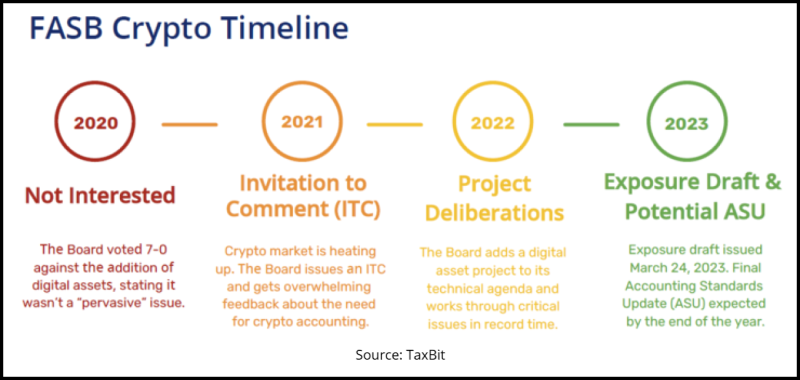
TaxBit joined NeuGroup’s digital assets peer group to make sense of crypto tax and accounting issues.
A revised cryptocurrency bill proposed by US Sens. Cynthia Lummis and Kirsten Gillibrand last week would provide much-needed clarity on issues including definitions for stablecoins, decentralized finance and—crucially—brokers. The bill joins proposals from the IRS, FASB and the Financial Stability Board, and yet-to-be-implemented standards from the Bank for International Settlements.
- However, at last month’s meeting of NeuGroup for Digital Assets, members shared that, despite a great deal of proposed crypto regulation, a lack of policy that’s actually been adopted is creating headaches, especially around tax and accounting.
- Two representatives from meeting sponsor TaxBit offered relief for the pain: Aaron Jacob, VP of enterprise accounting, and Erin Fennimore, VP of tax and information reporting, demystified uncertainties and untangled misconceptions around digital assets.
- TaxBit, which makes accounting software for digital currencies and NFTs, also provides advisory services to clients. In the session, Mr. Jacob and Ms. Fennimore offered answers to these questions:
- What is taxable?
- Do I need a money transmitter license?
- How do I account for the value of a digital asset like an NFT?
- What if I work with a third party that assumed the crypto risk?
What exactly is taxable? “Everything has tax and accounting consequences.” That phrase is how Mr. Jacob kicked off the session, emphasizing the importance of “not being caught in a foot fault” by regulators. The first step, he said, is to know what actions are taxed as defined by a 2014 IRS ruling that stated digital assets are property. He shared the list below:
- Selling a digital asset for fiat.
- Exchanging a digital asset for property, goods or services.
- Exchanging or trading one digital asset for another.
- Receiving a new digital asset as a result of a new blockchain’s creation via a so-called hard fork.
- Receiving a new digital asset as a result of mining or staking activities.
- Receiving a digital asset as a result of being sent a free digital token through what’s called an airdrop.
- Receiving or transferring a digital asset for free (without providing any consideration) that does not qualify as a bona fide gift.
Do corporates need a money transmitter license to transact in crypto? The answer is no for most companies, as they are not brokers.
- As defined by the 2021 Infrastructure Investment and Jobs Act, brokers include exchanges, platforms and digital wallet providers that transact on behalf of third parties. Ms. Fennimore added that the broad definition will need to be narrowed by regulators.
- Any brokers as defined by the Jobs Act, including crypto payment processors and NFT marketplaces, must obtain a so-called BitLicense from the State of New York if they want to do business in the US. BitLicenses require paying quarterly fees to maintain, which vary by broker.
Is an NFT taxable? Yes, but it’s complicated. Although an NFT sale is taxable, Mr. Jacobs said the act of creating an NFT, or minting, does not qualify as a taxable event. However, minting an NFT on the ethereum blockchain incurs gas fees, which are fractions of ether used to pay for the validation on the blockchain—which would be considered a taxable event.
- The virtual tokens are accounted for by adding the cost of minting plus a valuation of the newly minted digital asset. If the NFT is immediately up for sale or auction, the taxable value is the lowest price, or floor, at which it’s listed.
- If the NFT is not immediately available to purchase, one member at a crypto-native company suggested using the value of a comparable asset for sale. For example, if an individual mints an NFT tied to a famous athlete but doesn’t want to sell it, the corporate can use the price of other NFTs tied to a major sports figure, which would be comparable.
- “There’s just not a lot of authoritative guidance on NFTs, from FASB or IRS, and plenty of gray area to navigate,” Mr. Jacob said. “Companies should clear their approach with internal policy teams and potentially even auditors.”
How are taxes affected if a corporate, looking to avoid having crypto on the balance sheet, works with a payment processor? Some payment processors, including Mastercard and PayPal, offer services that allow individuals to pay with crypto, which is immediately converted to fiat before being sent to a retailer. In most cases, normal sales tax rules would apply, eliminating any need to worry about crypto accounting regulations.
- One member who works at a payment processor presented on his company’s tax and accounting infrastructure, which is built using TaxBit tools. This service assumes the accounting responsibility for the company and its clients; it also has a dashboard that provides real-time gain and loss information, with advanced reporting capabilities.

Questions on the horizon. Mr. Jacob and Ms. Fennimore said that, over the next year, enforcement and policy action is expected in much of the crypto industry, as regulators continue to navigate the new world of digital currencies.
- Earlier this year, FASB published a proposed update to its accounting standards which included accounting for cryptocurrency assets at fair value. A TaxBit explainer on the proposal said this update would remove “frustrating impairment charges” for crypto assets within the scope of FASB’s proposed guidance. Alongside a graphic shared at the meeting (see above), Mr. Jacob said he anticipates an update to FASB’s standards by the end of 2023.
- And in March, the IRS sought feedback on NFTs potentially being taxed as collectibles. TaxBit called the proposal and request for comments “good news as it represents much-sought collaboration from regulators on digital asset questions.”
- “Over the next six months, regulators will be all about enforcement,” said NeuGroup peer group leader Matt Thomas, who leads the digital assets group. “Once that’s done, then expect policy from FASB, with Congress moving forward in the meantime.”


